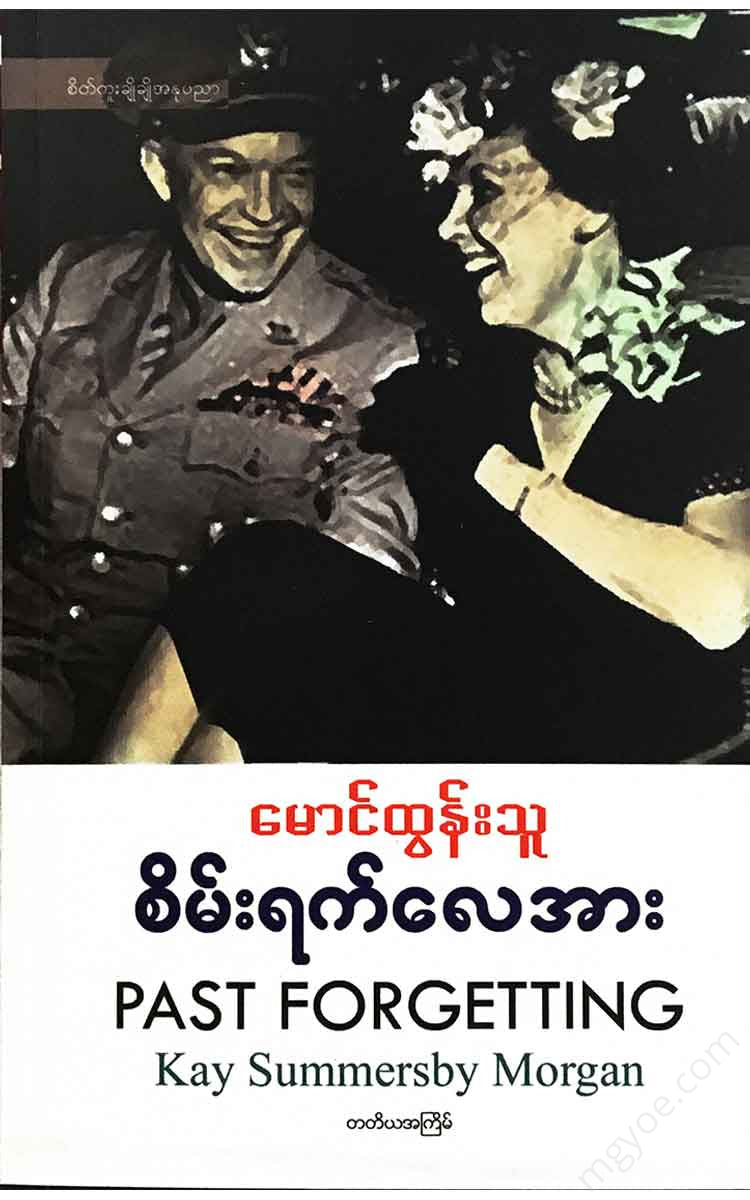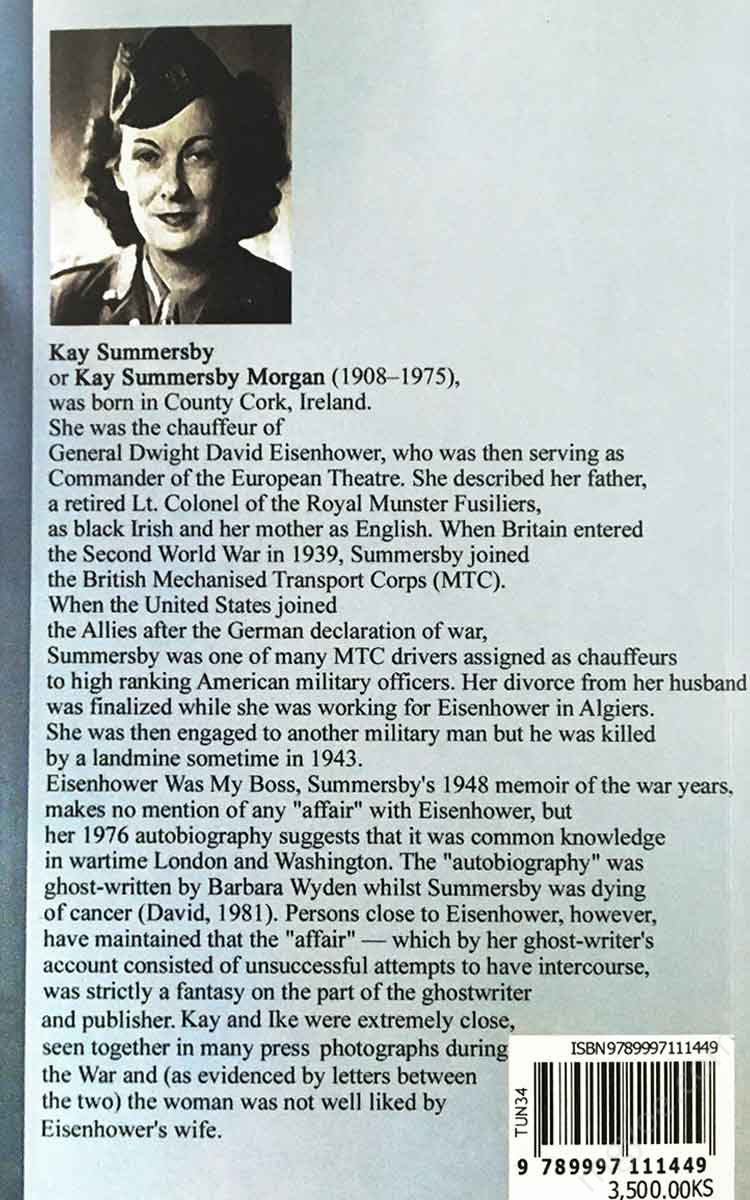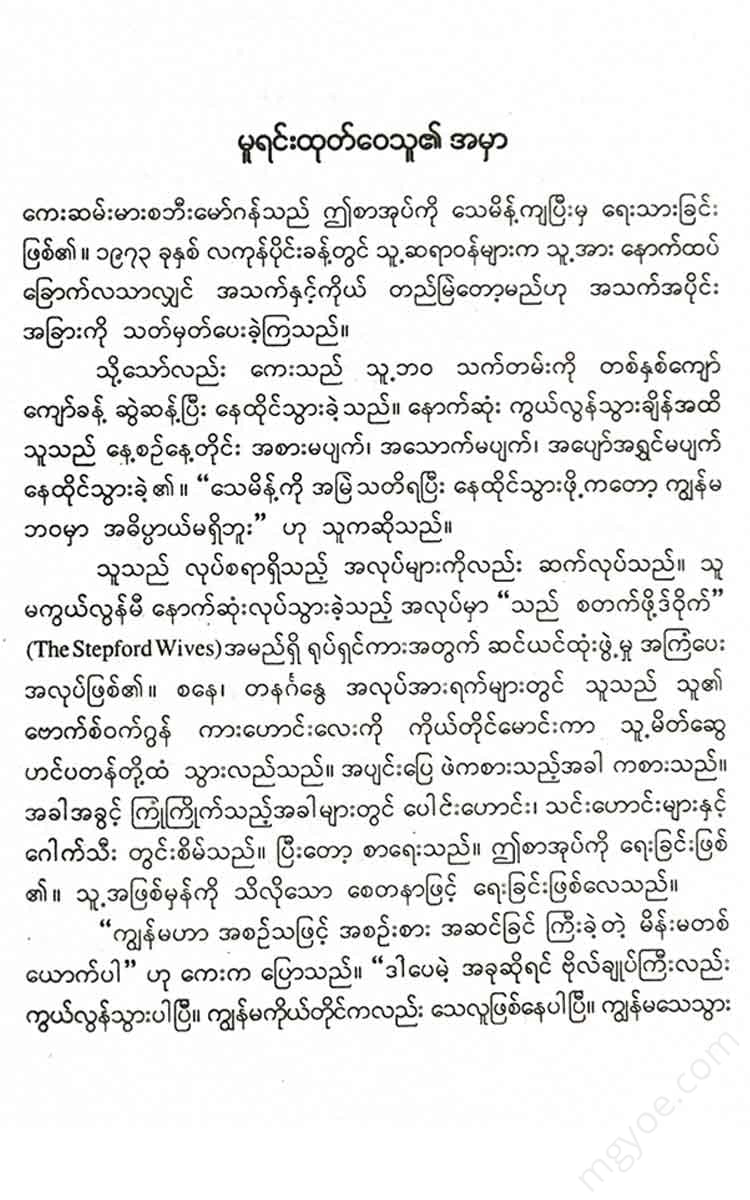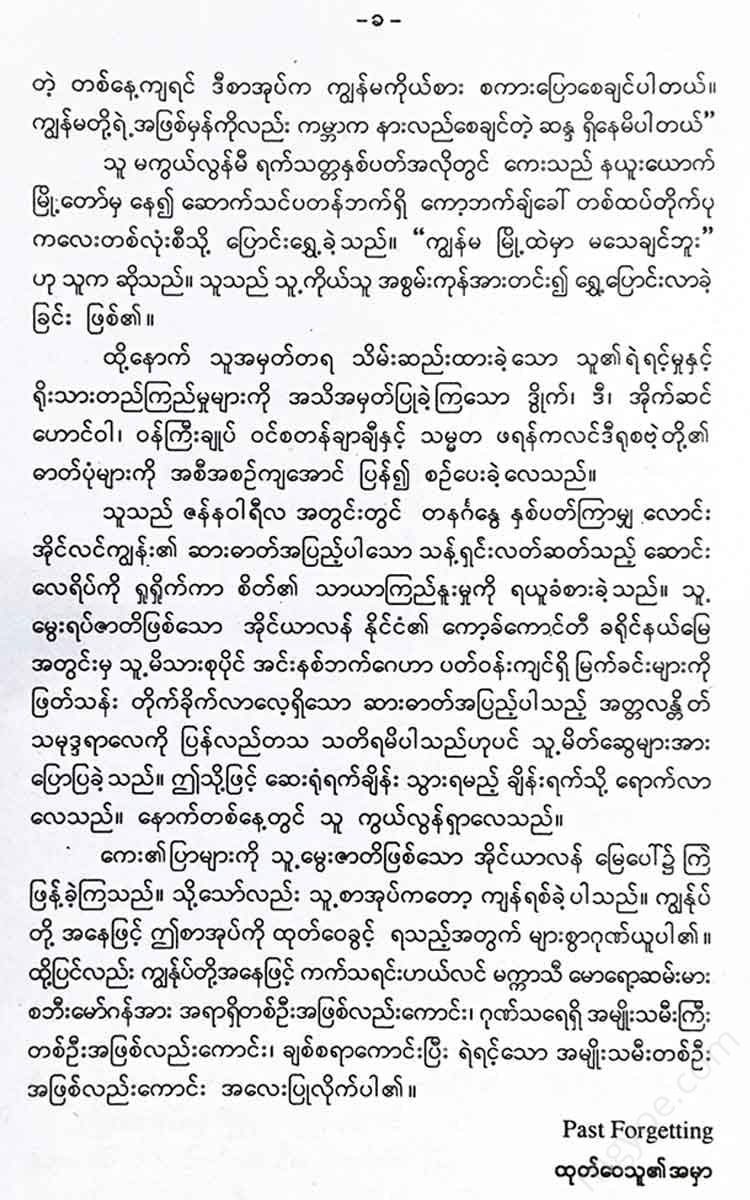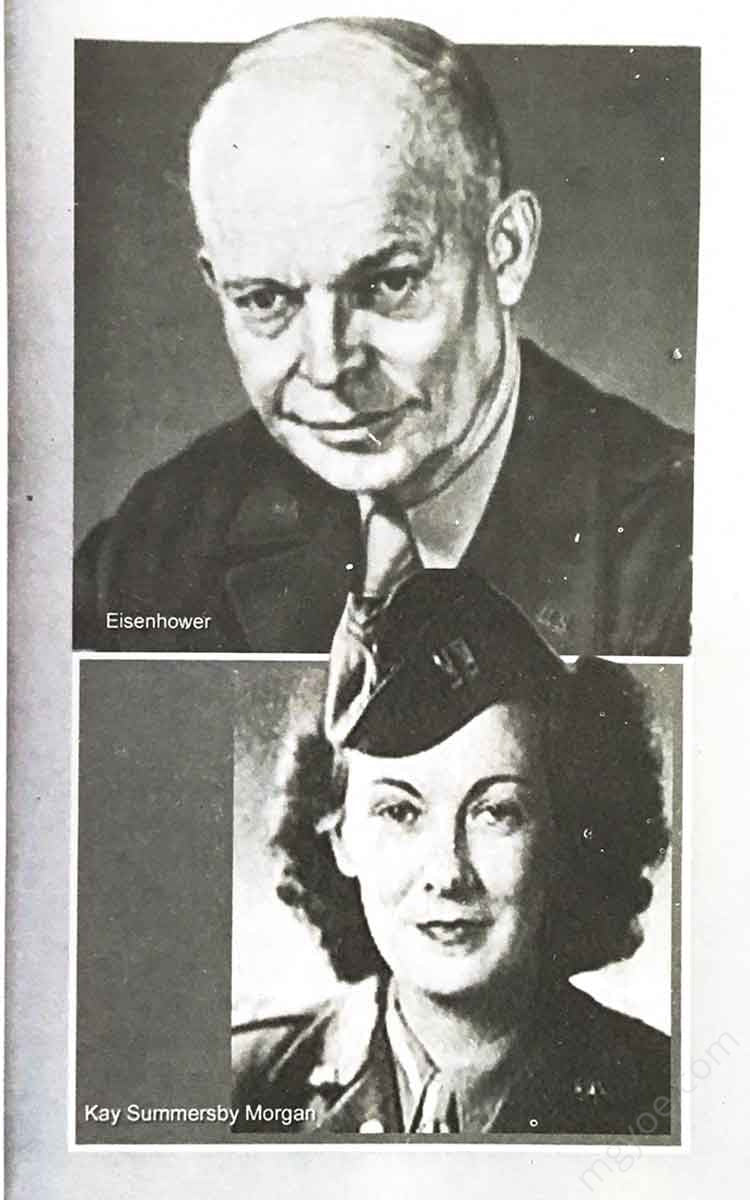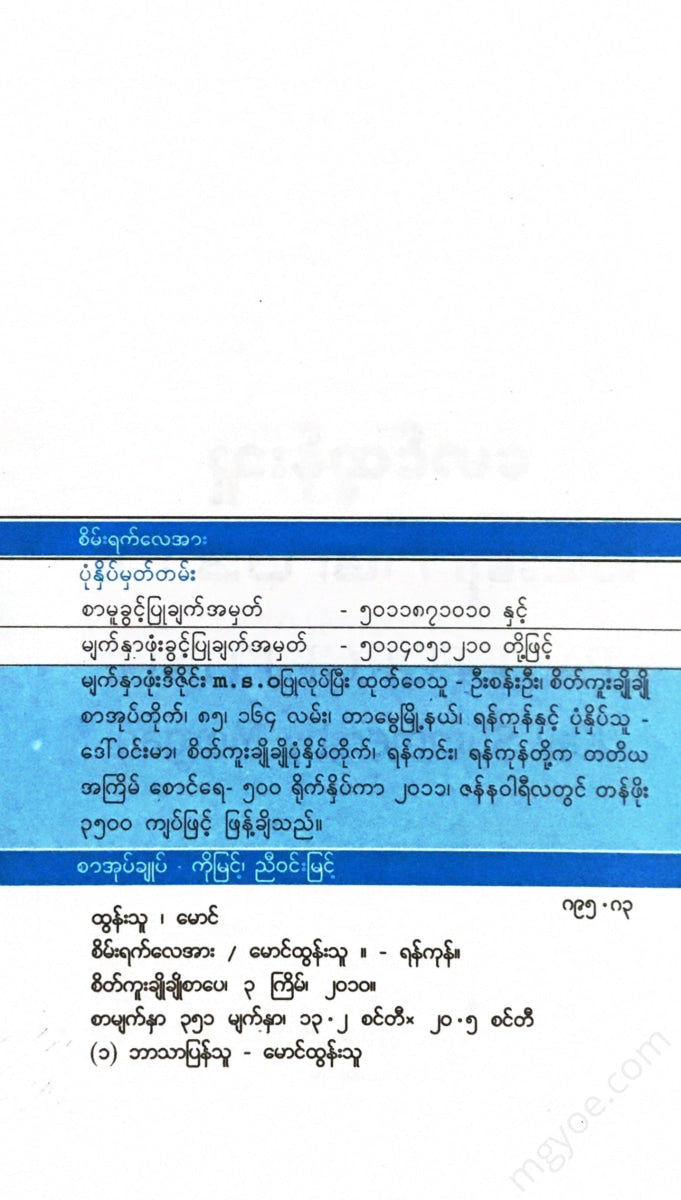စိတ်ကူးချိုချိုစာပေ
Maung Tun Thu - Green Day Wind
Maung Tun Thu - Green Day Wind
Couldn't load pickup availability
( 1 )
This incident certainly left me deeply hurt. However, as time passed, the wound I had received gradually healed, and in the end, only a scar remained. If I were thirty years old today and serving as the driver, secretary, and confidant of General Dwight D. Davis, the beloved Commander-in-Chief of the Allied Forces in Europe, I don't think there would be anyone who could compare our experiences.
Today, our situation would be considered a normal occurrence. With the dramatically changed social conditions of today, our situation would not be taken seriously. It would be considered a normal matter and forgotten.
But that was not the case with me. It took many years for people to forget the whole incident. Then, in my mind, there came a time when I thought people had forgotten the whole incident. At that moment, my story resurfaced again. This time, it resurfaced as if I had stabbed my wounded heart with a knife, wanting revenge.
The book is titled “Revelations: An Oral Biography of Halley S. Truman” by Marley Millar. By the end of the spring of 1973, before the book had even been officially published, the story of General Eisenhower and us, as told in some of its passages, had become front-page news in newspapers around the world.
The story is incredible. It has been four years since the General died. I have not seen him for more than a quarter of a century. I have already thought it was an ancient story. But the world does not seem to agree with my theory. Lloyd Shearer wrote in the Pride magazine: “The journalists are desperately searching for Kay Sumnersby. But they have not found Kay Sumnersby.”
There was a reason why the journalists couldn't find me. When this story was resurfaced, I was on the operating table. But, as journalists are a type of people who are persistent and relentless, an English national journalist finally tracked me down. He was going through old newspaper clippings and found out about a friend of mine who was mentioned in the same clipping. He then tried to get in touch with my friend.
“Miss P,” he asked. “I’m speaking from London. You were at Kay and Reginald Morgan’s wedding when they got married, weren’t you?”
My friend didn't doubt his question. He thought it was a simple question. "I did," he replied.
"They got married in my room."
"I'm an old friend of Kay's," he said. "I've been looking for Kay for a long time. Can you tell me where he is now?"
Actually, this was a lie. He and I had never even heard of his name, let alone known each other. My female friend didn't know about this. "There's a guy in a New York hospital. He's having surgery," she replied.
That's right. I'm in the hospital. I've just been released from the recovery room. I'm still receiving intravenous fluids in one arm. I still have a tube in my nose. I get a call from the hospital phone. It says I'm calling from a faraway land.
``Would I have the will to answer that phone call? To tell you the truth, I didn't. But I did. I had assumed it would be from my brother, Sheamus, who was eight thousand miles from New York in Jonabad. I had miscalculated. The caller was someone who was tracking me. .
“I'm still in London,” he said. “How's things going over there?” he asked.
Only someone who has undergone major surgery can understand my current situation. The anesthesia I was given during the surgery has not changed at all. I am still dizzy. I am still very tired and weak from the anesthesia. Talking is also a very difficult task.
"What's the matter?" I asked.
“I was asking about you and Ai,” he said. “Is that true or not?”
I didn't understand what he was talking about. I thought he was just a man interested in some ancient legend that he had heard a few times about.
I have encountered drunkards who call late at night to pay off gambling debts. But I don't think they are as bad as the one who called me while I was lying in the hospital and asked about my relationship with General Eisenhower.
“Nothing to say,” he replied and hung up. However, he had news to share. “Kessam Mosby Morgan, who has undergone surgery in New York City, has denied any wrongdoing in relation to reports that she and her husband have planned to get married,” the report said.
A conspiracy to harm others had been completed. The whole world knew where I was. The calls and telegrams from all over the world were pouring into the hospital.
I knew immediately why this was the case. One of my closest friends bought me a book. It had all the details President Truman had said about General Eisenhower, clipped to the pages.
It was no secret that President Truman had little respect for General Dwight Eisenhower. However, during the Potsdam Conference in 1945, President Truman, along with his Secretary of State James Barnes, visited General Eisenhower's headquarters in Frankfurt.
I remember thinking about President Truman at that time. The Big Three (meaning the leaders of the United States and England) were discussing very important issues at Potsdam, including the atomic bomb, a new weapon of the United States. I have not forgotten it. Before the fact that the atomic bomb existed was publicly announced, he had been discussing the military and political implications of the atomic bomb with his top officers for weeks. When they were discussing the bomb, I would often leave the room. This bomb was not something I wanted to know about.
Toward the end of the conference, Truman arrived in Frankfurt to inspect the 84th Infantry Division. On that hot July day, Truman was driven through the dusty south of Germany. All the way, Truman and Ai had been discussing the qualities of American soldiers. When they arrived at headquarters, they continued their conversation in Ai’s office. When their conversation was over, Ai called me over and introduced me to President Truman. I found him to be a very friendly, honest, and charming man.
At that time, I had a small diary. In that diary, I used to write down my personal notes and the general's appointments. When I looked back at the notes I had made that day, I found the following:
Aik left the office early to meet with the President. At 2:30, Aik called the President and Secretary of State Burnett into his office. Aik told the President that he wanted to be accepted as an American citizen.
That day was a momentous day for me. Because of what President Truman and I said that day, about three months later I had to go to Washington and file the important paperwork to become an American citizen.
Today, twenty-eight years later, I am curled up in a hospital bed, half-sitting, half-reading this story over and over again, in disbelief. President Truman told his biographer, Mary Millar, “Immediately after the war, Eisenhower wrote a letter to General Marshall. In it he stated that he wanted to return to the United States, that he wanted to divorce his wife, Mrs. Eisenhower, and marry this Englishwoman.”
'Ai's request was rejected with a lack of consideration and compassion. Even President Truman, who spoke his mind openly and uncompromisingly, was shocked by the brutal and harsh response.
“Marshall wrote a letter to Eisenhower about this,” President Truman said. “I’ve never seen a letter like it. Marshall wrote that if Eisenhower did something like this, he would not only be thrown out of the army, but he would be deprived of a normal breath for the rest of his life. And if he ever said anything like this again, he would be put in hell.”
Then President Truman said, “One of my last tasks as president was to take all those letters from Ai’s personal files at the Pentagon and destroy them.”
Some of these pages in this book shook me. I needed to try to calm my restless mind. I thought I needed to be quiet, even in a hospital bed, away from people. Wouldn't that give me more time to reflect on my life, which I had lived in silence for so many years?
However, it was not easy to achieve the peace of mind I sought. The hospital had turned off all outside telephones, so I was free from interruptions, but it was difficult to avoid the reporters. Their group was stubborn and unbelievably stubborn. They were determined to get what they wanted, and they were determined to get it.
One day I was returning from my usual walk. I saw a small woman sitting at the foot of my bed. I thought she must be the daughter of one of my friends. But she wasn't. She was a reporter for the Philadelphia Inquirer. She had come into my hospital room by herself and was sitting there waiting for me. I was so angry that I couldn't bear it.
“How did you get into this room?” I asked. “I am a person who recently underwent surgery for a serious illness. I am not feeling well yet.” I was telling the truth. The full report from the pathology department had just arrived today. According to the report, my illness was cancer. Liver cancer. It was a disease that was completely hopeless.
My doctor told me about the condition, so I understood it early on. However, I didn't really understand the nature of the disease. Now that I know for sure, I can't even begin to understand how I feel.
“I don't think your editor would appreciate the kind of work you're doing now,” I said.
He didn't move. He just sat there, anchored.
"Please leave the room. If you don't tell me, I'll have to get someone to drag you out."
Only then did he get up from his seat.
"Can't you tell me anything?"
he asked.
I won't speak. I won't speak. I won't even say goodbye. I turn my back on him. My whole body trembles with weakness and hurt.
Later, many reporters came to the hospital in various ways. I just replied, “I have nothing to say.” They just turned around and left. Later, the nurses started to ask me about this.
A teacher would say, “Take the bandage off your mouth, it’s time to bandage the wound.” As soon as I had enough energy, I ran away from the hospital. I had insisted on leaving despite my doctor’s pleas. I had left with the intention of going with friends who had promised to make arrangements so that I could relax and have some peace and quiet.
The fact that General Eisenhower wrote this letter to General Marshall is something I was completely unaware of. I swear. I was completely unaware of it. When I look back at the time when I wrote it, there was no situation at that time that would have allowed me to write this letter. Nor was there any situation later in that time that would have allowed me to write it.
What I found interesting was what Lieutenant General Harry Baughman, who was President Truman's bodyguard, told reporters. He said that the matter of these letters had been a rumor since 1952. “At that time, Republican Ohio Senator Robert Taft and Eisenhower were running for president. Taft’s supporters were talking about the letters that Ike had written to Marshall. They wanted copies of them. Truman heard about it. Truman didn’t want the letters copied and distributed by Taft’s supporters all over the country. That’s why he got involved. But I don’t think he destroyed them. I think he sent them to Marshall with a letter he wrote himself. In his letter, he said, ‘These are letters that you should keep in your file. I don’t think they should be used in a very dirty political way,’” Harry Baughman said.
To tell you the truth, I had never heard of the rumors that had been going around since 1952. It was not until after 1952 that I had any inkling that these letters existed. But I didn’t believe them. About five years ago, my friend David Sedsky came to see me and said, “Dimekay, I want you to be on a television program.”
"sounds good"
I replied accordingly.
“What do you want me to talk about?”
"About the letter," said David.
